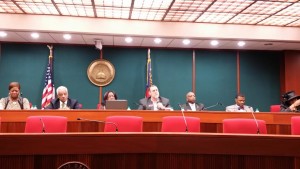Excluded Black Lawmakers Hold Own Hearing on Medical Cannabis in Georgia
 (APN) ATLANTA — On Tuesday, October 20, 2015, the Georgia Legislative Black Caucus (GLBC) held a Minority Medical Cannabis Commission Hearing to gather information and recommendations from their community.
(APN) ATLANTA — On Tuesday, October 20, 2015, the Georgia Legislative Black Caucus (GLBC) held a Minority Medical Cannabis Commission Hearing to gather information and recommendations from their community.
Minorities testified on how consistently the door has been shut to their participation in the legislative process related to medical cannabis in Georgia.
Not one Black doctor is on the Georgia Medical Cannabis Commission, nor are there any Black legislators or law enforcement members on the Commission.
“It is a travesty that African Americans and Latinos were all left out of the conversation. We represent a large majority of the state and we want to make sure everyone has a voice and a seat at the table,” State Rep. Dee Dawkins-Haigler (D- Lithonia) told Atlanta Progressive News.
Kenneth Williams, CEO of Neo-Biz Solutions, an administration firm that submits applications for research institutions, has been working with Morehouse School of Medicine (MSM) for four years.
Williams testified that when he contacted LaSharn Hughes, Executive Director, with the Georgia Composite Medical Board, in October 2014, regarding the proper way to submit doctors for seating on the board, he was told the Board had been dismantled.
Williams shared part of those emails with APN, one of which states: “The Committee has not been seated since the 80’s the board is not currently recruiting members. The matter has been tabled until the legislature makes a decision on the outcome of statewide meetings regarding medical marijuana.”
In yet another email to MSM, Hughes said the Board had been dismantled, according to Williams.
Williams said that Hughes had lied and that shut the door on MSM seeking to submit applications for their physicians to be on the Commission’s Board, Williams testified.
CyPherRules 420 (CPR 420), an information and health solutions provider who is initiating one of many national cannabidiol (CBD) clinical studies, sent representatives to the hearing.
They have been trying to provide clinical data and information that legislators and doctors want, but said they ran into roadblocks and conflicting information.
“We have been bounced around from the State Board of Regents to the Composite Board to the Drug Enforcement Agency (DEA) at the state level; back to the Department of Justice then back to the Medical Review Board and again back to the State Board of Regents,” Mark Prosper, Regional Vice President of Sales at CPR 420, testified to GLBC.
“The best answer we have got at the state level is – we will get back with you,” Prosper said.
CPR 420 has not been allowed to access the data from Georgia’s clinical trials to compare it to other national clinical studies.
“I think it is absurd to only get data from one company (GW Pharmaceuticals) and that company is the one that is producing the oil and based in the United Kingdom. Especially when the bill is written in such a way that it says other companies are allowed to come in and perform research. We have spent months trying to be involved in the process and the door has been closed at every turn,” Prosper told APN
“The Governor [Nathan Deal] and [State Rep.] Allen Peake (R-Macon) are doing an exceptional job. All we are asking is to make sure we are all inclusive in the process,” Coach Harris, Regional Vice President of Sales, CPR 420 told APN.
Dr. Uma Dhanabalan, a Harvard educated physician, recommended to GLBC that physicians and health care providers be trained in the endocannabinoid system because they will not learn about it in medical school.
Dr. Uma testified that doctors don’t need a list of which diseases they can or can’t treat with cannabis. Physicians should make the decision on how to treat their patients, not politicians.
Sharon Ravert, Executive Director, Peachtree NORML (National Organization for the Reform of Marijuana Laws) gave shocking statistics at the hearing that Georgia arrests 30,000 plus individuals per year for cannabis-related charges. In 2011, 93 percent of those arrested for simple possession in Atlanta were Black.
“This is ironic, considering that most of the marijuana consumed is actually by Caucasians. If this does not highlight the need for inclusion and diversity when discussing this issue, nothing will,” Ravert said.
David Ballengee, a disabled veteran with Post Traumatic Stress Disorder (PTSD), said that veterans were also not represented on the Board.
Other recommendations from participants were for a clinical observation component; a department that aggregates the data to make sense of it and a process to access the data; adding chronic pain and Lupus to the list of illnesses that can legally relieved by cannabis; and the need for in-state cultivation.
(END/2015)